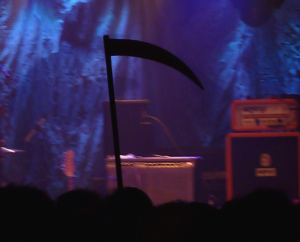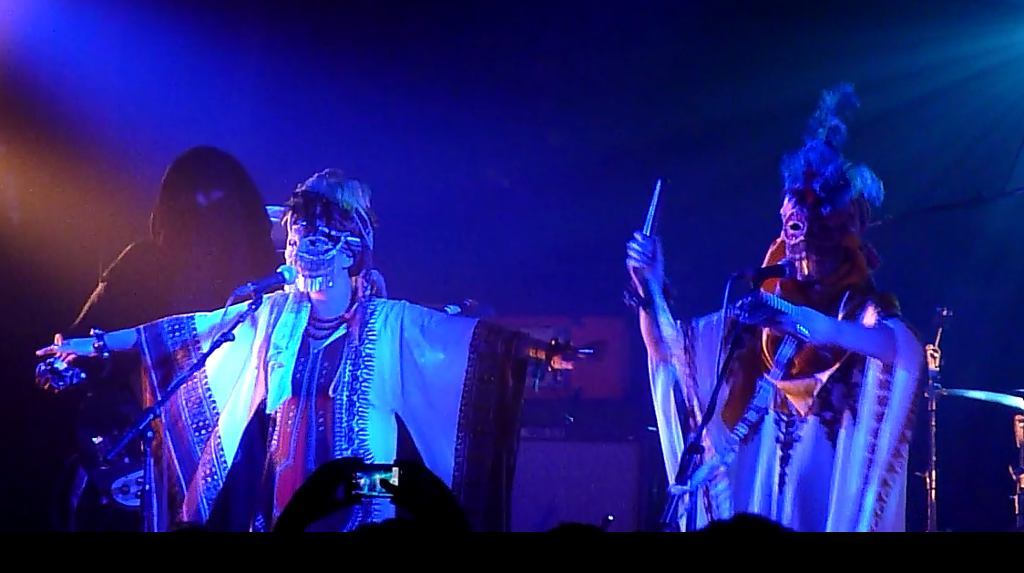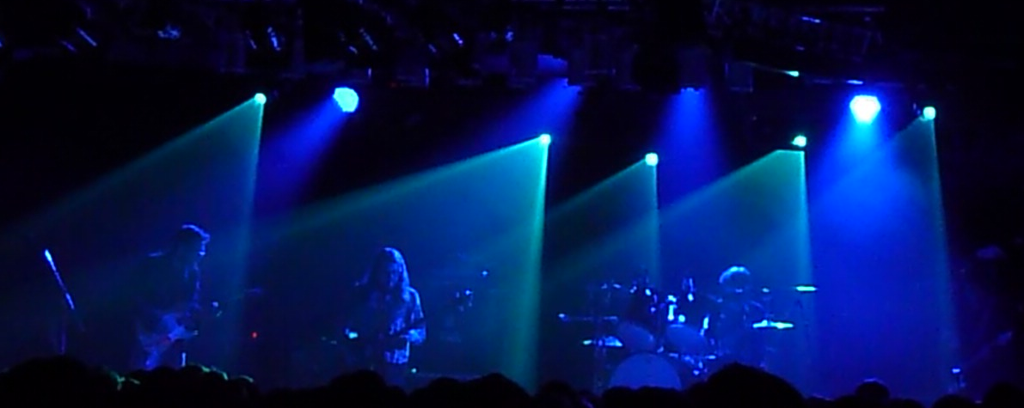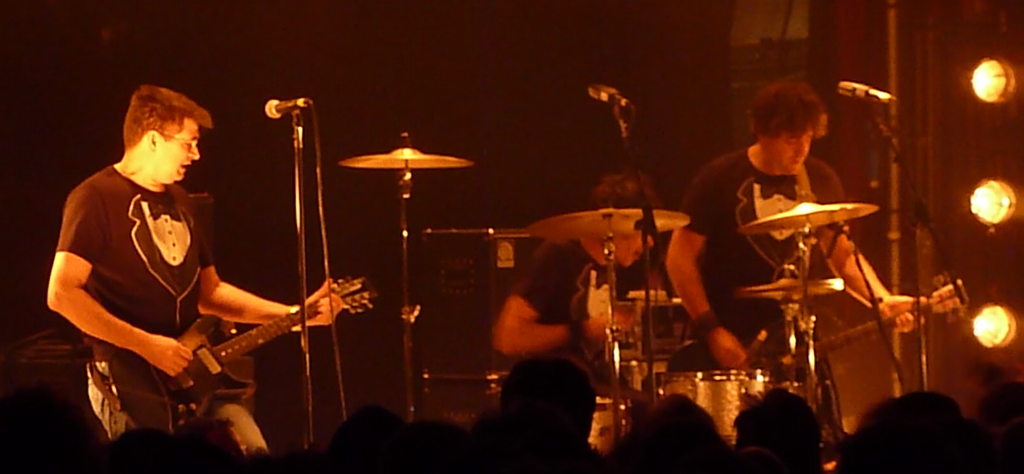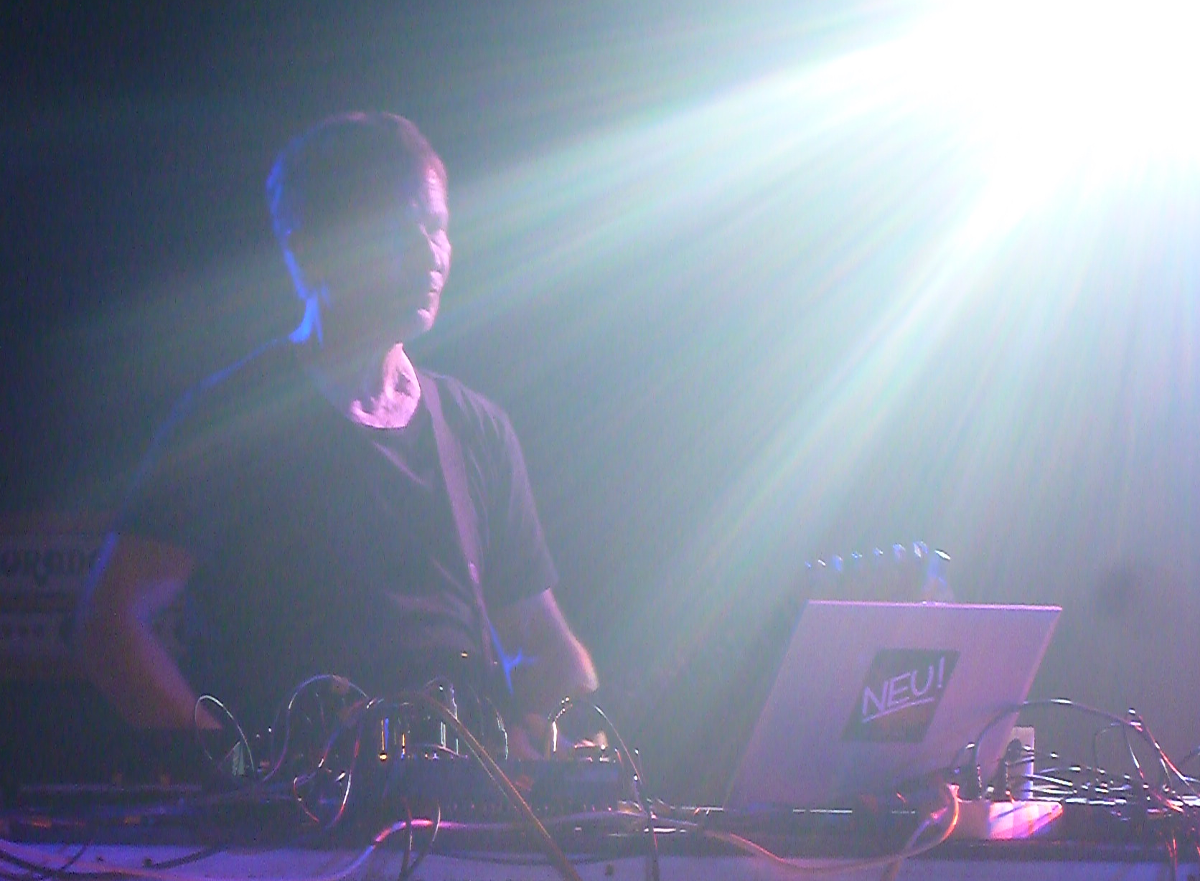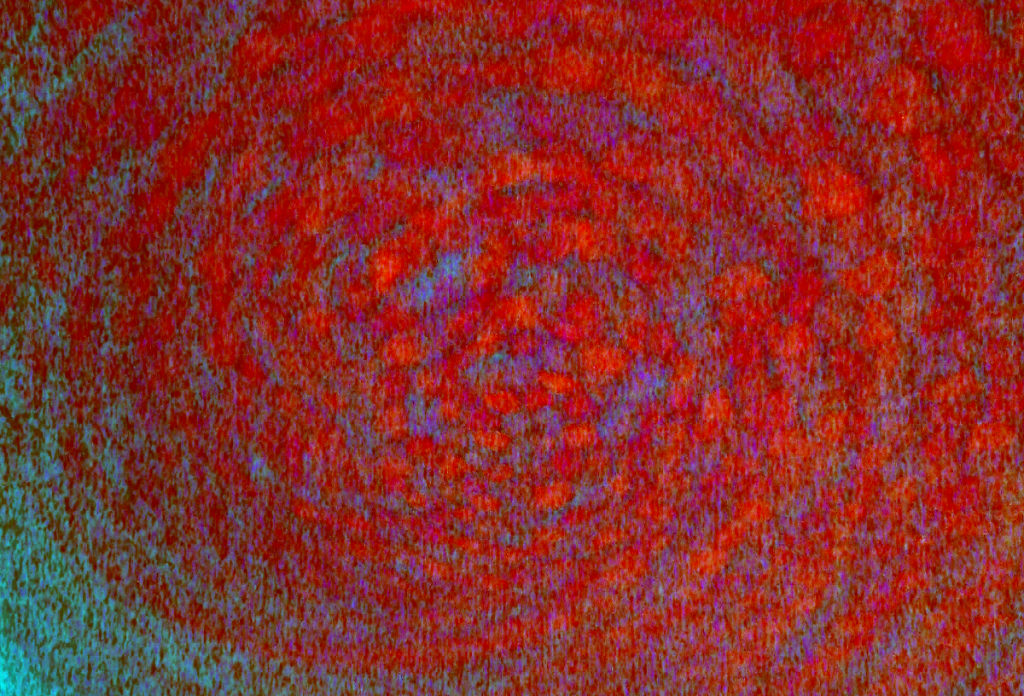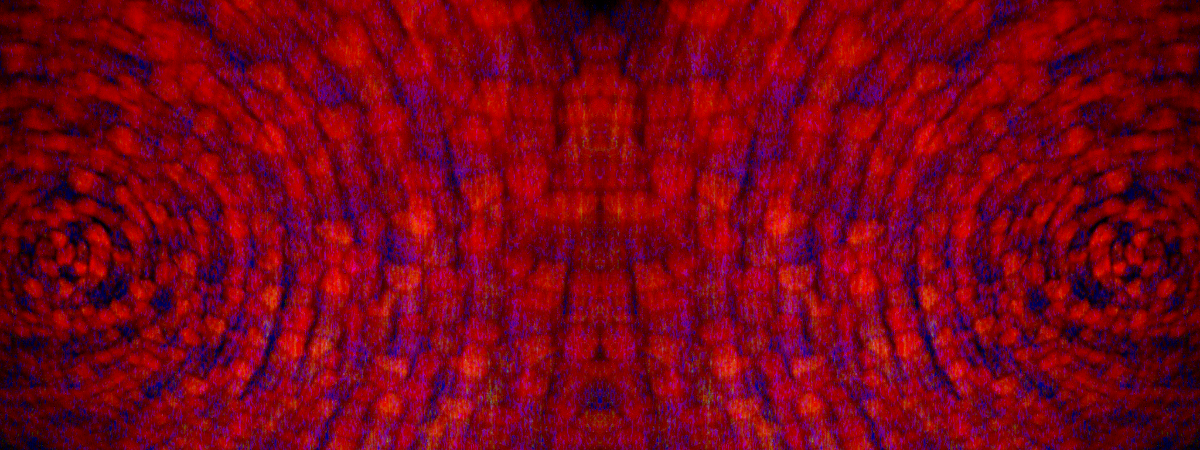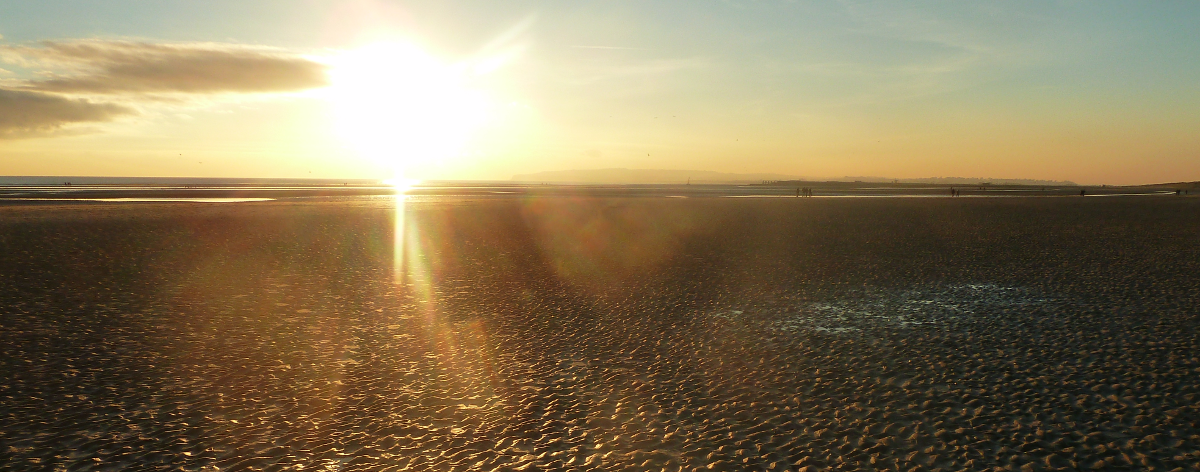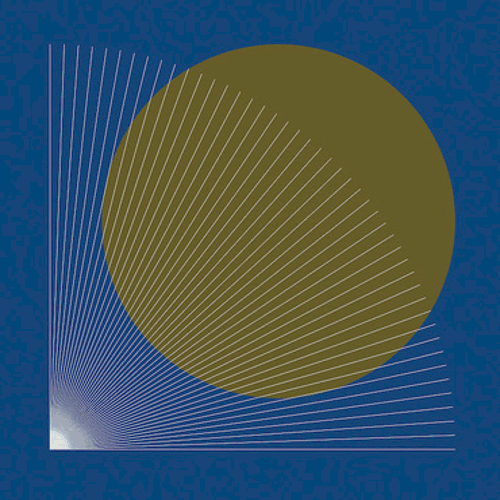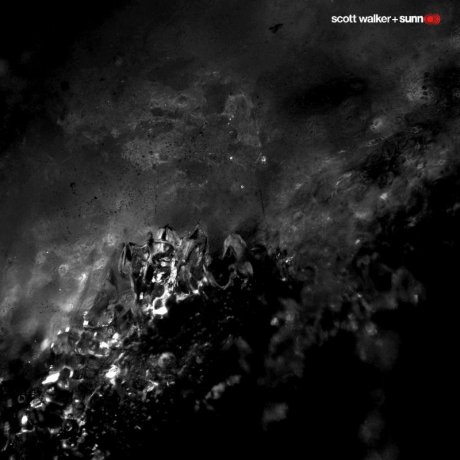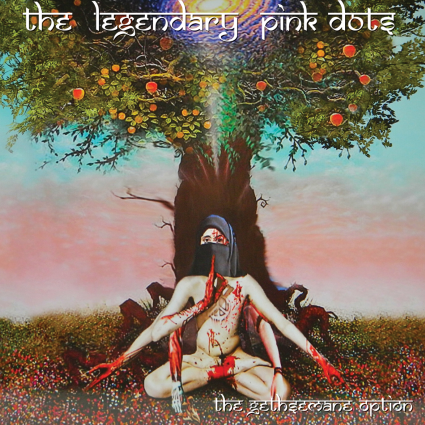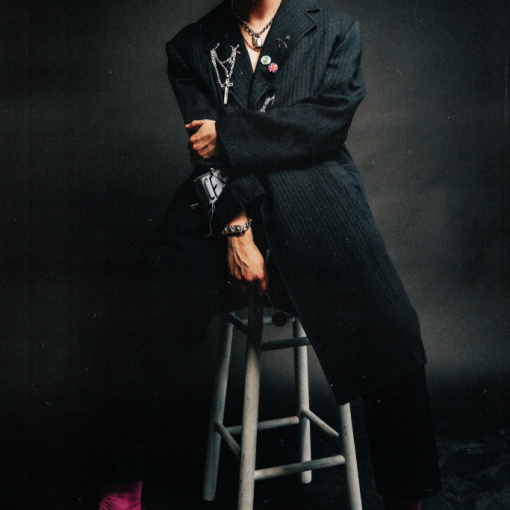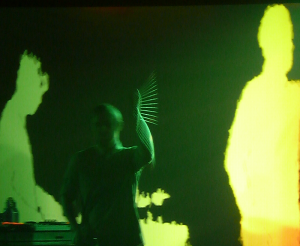 Camber Sands, Sussex
Camber Sands, Sussex
29 November-1 December 2013
So it came, as the subtitle says, to the very end of an era for All Tomorrow’s Parties on the English coast. Returning full circle to Pontin’s at Camber Sands where it all kicked off 13 years ago (barring the festival’s origins with Belle and Sebastian‘s Bowlie Weekender a year earlier in 1999 at the same spot), ATP brought out its glad rags and old friends to take rock and roll and variations thereof on a musical jaunt to the seaside one last time.
With recent line-ups often being somewhat less enticing than the earlier events and with declining numbers apparently attending, it’s not such a surprise that the time when holding an off-season indoor festival four times a year or more has essentially run its course. All good things must turn towards new ideas and places, or stagnation will result – so ATP’s off to Iceland once again, and further afield to Denmark and Brazil, it seems. One sign of the end times is that – in stark comparison to the alternate ATP home at Butlin’s in Minehead – Pontin’s has seen better days, and those were probably some decades ago. The much-trumpeted refurbishment doesn’t seem to extend a lot further than some quite nifty fake wood-effect vinyl floors in the chalets, a fresh lick of paint here and there, and signs proclaiming the camp’s freshness.Non-functioning – then bursting – hot water boilers seem to have been a regular occurrence over the weekend, anecdotally at least, though the vinyl floor did come in handy when the Freq chalet took on an early morning flood after a first night of freezing showers. Still, the maintenance staff were good blokes, and despite a few other minor problems (beeping hard-wired smoke alarms are not conducive to getting much sleep after a 5am festival bedtime) it’s still many times better than camping. The surprisingly agreeable weather – not one drop of rain the whole weekend has to be a record of sorts for Sussex in December – and sunset panoramas on the beach were well worth the trek, and that in turn was far easier than the long and winding road to Minehead for those using London as a start point.
*
So much for the pros and cons of the venue. The music selection for the week, curated jointly by Loop and ATP, held the usual mix of the great and the good and the relatively average, depending on personal taste of course; though even if a band wasn’t to any particular festival-goer’s preference, they were at least all of high quality in their own field. The arrangement of the stages into the huge upstairs venue, just about capable of fitting the whole festival’s crowd, and the smaller downstairs space which often got rammed to uncomfortable level was, again, largely preferable to the scattered and less capacious sites at Minehead. Butlin’s also suffered from placing some bands in the vast open space of the atrium there with all the resulting echo problems which ruined many a fine performance. Upstairs at Camber Sands, by contrast, had a particularly good PA on hand for the festival, however, and once the early low volume levels were adjusted (Om in particular suffered from a disappointing lack of chest-crushing bass) the sound there was precise, present and satisfyingly weighty. The smaller stage two was well served for sound too, but its layout – wide rather than long, scatted with pillars – was far less conducive to a good experience with all the crowdedness which comes with a confined space; though if the front could be reached it was fine.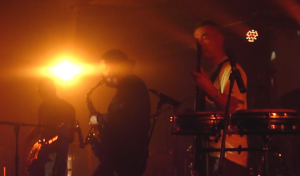 Inevitably at any festival, there will be the bands which were missed either through timing conflicts (putting Comets on Fire on at the same time as Loop seemed particularly unfortunate), the need to eat and sleep (it would have been nice to see Jozef van Wissem, perhaps, but 1230 on a Sunday is never going to be a great festival time for a big audience turnout) and the lure of weird films on the camp’s cable TV channel: again, there were supposed to be two on offer, but Pontin’s could only provide one – but who really goes to a festival to watch television, no matter how cultishly offbeat. Speaking of which, Errol Morris‘ Vernon, Florida (1981) and The Gates of Heaven (1978) were especially odd, offering some fascinating human interest in their respective subjects of the inhabitants of a small town in the deep South and the travails of running a pet cemetery in the Napa Valley. With an editorial style whose willingness to let the interviewees ramble on as much as they liked, both films as often verged on the tedious as they did the appallingly engrossing.
Inevitably at any festival, there will be the bands which were missed either through timing conflicts (putting Comets on Fire on at the same time as Loop seemed particularly unfortunate), the need to eat and sleep (it would have been nice to see Jozef van Wissem, perhaps, but 1230 on a Sunday is never going to be a great festival time for a big audience turnout) and the lure of weird films on the camp’s cable TV channel: again, there were supposed to be two on offer, but Pontin’s could only provide one – but who really goes to a festival to watch television, no matter how cultishly offbeat. Speaking of which, Errol Morris‘ Vernon, Florida (1981) and The Gates of Heaven (1978) were especially odd, offering some fascinating human interest in their respective subjects of the inhabitants of a small town in the deep South and the travails of running a pet cemetery in the Napa Valley. With an editorial style whose willingness to let the interviewees ramble on as much as they liked, both films as often verged on the tedious as they did the appallingly engrossing.
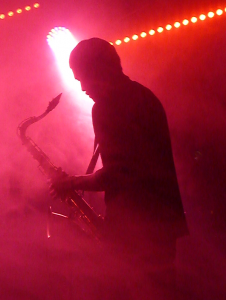
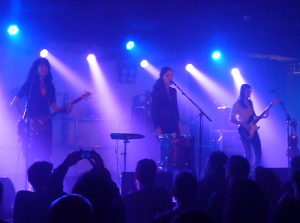 Thought Forms provided an early festival show which might have done better downstairs, though they certainly took advantage of the PA to work through their scrawling post-Sonic Youth guitar noise. They and Les Colettes were two of the few female-fronted groups in the lineup, and the latter’s Francophone vocal harmonies combined with an off-kilter guitar-bass-drum-violin-electronics stage presence was lively and joyfully delivered. The KVB gave some guitar sking attitude courtesy of a cool Nicholas Wood to counterpoint Kat Day‘s fiercely buzzing keyboards and Suicideal drum machines; and there was a similar amount of onstage drum machine klang and scraped metal scrawling from The Dirty Beaches, along with a seriously impressive amount of smoke. Wrapped in stark, shifting lighting (the red bars of spots which resembled electric heating elements were particularly effective in upping the sinister impression of being inside an oven) and using the dynamics of some very weighty bass to full effect. Insertions of brutal noise and energetic contortions from main man Alex Hungtai touched just at the edge of true greatness, somehow just missing exactly the right amount of time dedicated to any particular element of their set, which was otherwise another welcome introduction to an otherwise only previously heard-of band, thankfully now witnessed in full flight at the festival.
Thought Forms provided an early festival show which might have done better downstairs, though they certainly took advantage of the PA to work through their scrawling post-Sonic Youth guitar noise. They and Les Colettes were two of the few female-fronted groups in the lineup, and the latter’s Francophone vocal harmonies combined with an off-kilter guitar-bass-drum-violin-electronics stage presence was lively and joyfully delivered. The KVB gave some guitar sking attitude courtesy of a cool Nicholas Wood to counterpoint Kat Day‘s fiercely buzzing keyboards and Suicideal drum machines; and there was a similar amount of onstage drum machine klang and scraped metal scrawling from The Dirty Beaches, along with a seriously impressive amount of smoke. Wrapped in stark, shifting lighting (the red bars of spots which resembled electric heating elements were particularly effective in upping the sinister impression of being inside an oven) and using the dynamics of some very weighty bass to full effect. Insertions of brutal noise and energetic contortions from main man Alex Hungtai touched just at the edge of true greatness, somehow just missing exactly the right amount of time dedicated to any particular element of their set, which was otherwise another welcome introduction to an otherwise only previously heard-of band, thankfully now witnessed in full flight at the festival.
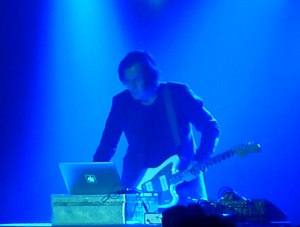 While Fennesz‘s music is more influential than derived from any particular sound which came before him, and while his deployment of avant-shoegaze with glitching electronica often sounds incredible on headphones, here in the huge space of the upstairs stage it seemed flatter somehow. While he certainly filled the room with waves of blissful sound, Fennesz’s stage presence of laptop and solo guitar seemed out of place. Barring stretching out for a while on the eye-burningly psychedelic carpet to enjoy the enveloping music with eyes firmly closed and with a willingness to drift away, there was little to engage the listener in need of visual stimulation. If there had been comfortable seating handy though, Fennesz’s set would probably have been perfect.
While Fennesz‘s music is more influential than derived from any particular sound which came before him, and while his deployment of avant-shoegaze with glitching electronica often sounds incredible on headphones, here in the huge space of the upstairs stage it seemed flatter somehow. While he certainly filled the room with waves of blissful sound, Fennesz’s stage presence of laptop and solo guitar seemed out of place. Barring stretching out for a while on the eye-burningly psychedelic carpet to enjoy the enveloping music with eyes firmly closed and with a willingness to drift away, there was little to engage the listener in need of visual stimulation. If there had been comfortable seating handy though, Fennesz’s set would probably have been perfect.
*
Being a festival, there was more than just live music to keep the proceedings going. The KISS-themed bingo was a rollicking good laugh, turning the somewhat artificial pub-alike surroundings of The Queen Vic (whose carefully-arranged shelves of faux-Victorian vases and other breakable knicknacks did vibrate stupendously well during The Dirty Beaches’ set in the next room, and without incident) into a comedy version of rock bars everywhere. Likewise, the karaoke nights provided their own particular form of amusement, though how being assaulted by largely inept renditions of popular crowd-pleasing ballads while crowding to a bar for a half-hour wait to be served as the glasses ran out qualifies as entertainment is one of the signs which gives the impression that the end times of Western civilization are already here. (Freq’s own Deuteronemu 90210 did win both an inflatable flying-V guitar and a Santa Claus The Movie DVD for his vigorous rendition of Bon Jovi‘s “Living on a Prayer,” however).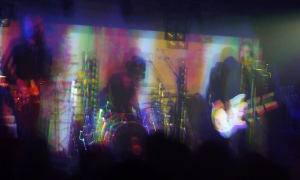 So to the personal performance highlights. Föllakzoid were the band most asked about afterwards as to whether their set was witnessed, and it was well worth catching – especially for their eye-burning light show of rippling vertical and horizontal bars of lysergic RGB projections. While their albums are good and spacious, live the group turn out to be even better, their guitarists full of bouncy enthusiasm, one on the left bobbing up and down in his woolly hat as he played, the whole band exuding a bright, youthful warmth in person and through their music. Once again, their influences were in full evidence, from Suicide to NEU!, but Föllakzoid’s infectious joie de vivre made their performance stand out, and marked them as a band to keep an ear on.
So to the personal performance highlights. Föllakzoid were the band most asked about afterwards as to whether their set was witnessed, and it was well worth catching – especially for their eye-burning light show of rippling vertical and horizontal bars of lysergic RGB projections. While their albums are good and spacious, live the group turn out to be even better, their guitarists full of bouncy enthusiasm, one on the left bobbing up and down in his woolly hat as he played, the whole band exuding a bright, youthful warmth in person and through their music. Once again, their influences were in full evidence, from Suicide to NEU!, but Föllakzoid’s infectious joie de vivre made their performance stand out, and marked them as a band to keep an ear on.
Om‘s early evening set on the Friday was let down by that night’s quiet levels upstairs, so where there should have been auditorium-filling waves of bass, the low end barely reached much further beyond the midpoint of the sound desk. Still, an impressively-bearded Al Cisneros gave his customary impassioned performance, with most of the setlist drawn from the recent genre-bending Advaitic Songs. Emil Amos‘ drumming was the key to Om’s sound in conjunction with Cisneros’s ponderously doomy bass, as ever, but it is the addition of Robert Lowe AKA Lichens at the dub controls which has lifted their sound into a new level. Throughout the gig, Lowe deployed echo trails which rippled off into the aether, slipping synth splashes and subtle samples into the mix to delirious effect.
Shellac and Slint both provided no real surprises later that evening while being their usual excellent selves. Steve Albini and company were in fine fooling in their tuxedo t-shirts and mordant humour, delivering a session which finally broke the Friday night quiet, Bob Weston‘s bass and Todd Trainer‘s drumming kicking up a storm all the way to the back of the bigger room. Slint brought their unique take on quiet-quiet-loud to the same venue for that night’s finale, which did have the unfortunate consequence that many of the by-then well-oiled crowd ended up chattering through the parts where no-one really needed to hear a discussion of whatever might amuse the average ATP goer. Withal, their show made a perfect end to the opening night, and it was one of those sets which could have continued yet longer than its already decent 75-plus minute duration. The prospect of seeing a reformed 23 Skidoo was an enticing lure to this ATP, though passing through the downstairs area while the quartet soundchecked was unfortunately not too promising. Where their records were exemplars of post-punk industrial global funked-up gumbo, the sounds emanating from the speakers was decidedly less angular, less harsh than expected. Still, squeezing into place just in front of the speaker stack at least ensured that the sound levels would be high (they were) and the bass in particular would give any nearby internal organs a good pummelling (it did).It’s a promising sign when the rhythm section of a band are wearing a form of sports gear, and as the set kicked off, so did and Johnny and Alex Turnbull on bass and drums respectively in an energetic display of virtuoso groovemaking. Throughout the set, Johnny was notable for his deft switches between juddering, sinuous basslines and ebullient polyrhythmic sessions on the congas, the only problem being that he lacked sufficient extra arms to play both simultaneously. Jim Wheelan‘s guitar was fractious if maybe a tad restrained, but Thom Heslop seemed a little tired and his vocal performance never really took off, though his sax playing was on good form. All in all, it was a highly enjoyable – if perhaps tamer than desired – show, and simply seeing 23 Skidoo play live was a wonder, one which only left the question of how they must have sparkled the first time around when their particular collision of influences was a fresh and invigorating sound.
One of the truly joyous moments of ATP was when Michael Rother came to the upstairs stage early on Sunday evening, at just the right time to get events properly started for the last night of the last day of the last ATP holiday camp festival. As with most of his recent gigs for the last few years, he was billed as playing the music of NEU! and Harmonia. While previous live sidemen have included Steve Shelley of Sonic Youth as well as the stupendously NEU!-like Camera (who are well worth checking out as examples of how to do the can’t-believe-it’s-not-band-XYZ schtick right) to lesser or greater effect, Rother was accompanied, as for Hallogallo 2010, by Aaron Mullan (of Tall Firs, also playing this ATP, and also missed) on bass and none other than Hans Lampe, former drummer with La Düsseldorf, thereby bringing back into the spotlight another long-assumed forgotten legend of the heyday of kosmische musik and the endlose gerade.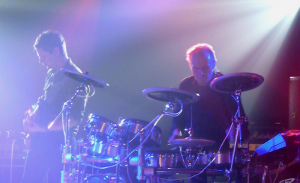 Lampe’s drumming rested somewhere in between previous Rother collaborator Jaki Liebezeit‘s metronomic, hypnotic pulse and his own work as the rhythm engine of La Düsseldorf (alongside Thomas Dinger). Rother, sequestered behind a laptop and mixer, let slip a brightly-flowing stream of guitar melodies, fuzz and phase rolling across each track in tunes which got the psychic juices flowing while the bass and drums worked on the dancing feet. The setlist was a familiar mix of Harmonia and NEU!, though the concluding “Dino” was transformed into almost unrecognisable shapes; but in general the liquid joy of both groups has rarely sounded so crystalline in recent years. Most touching of all was Rother’s celebratory dedication of the surprise inclusion of “Negativland” (complete with sampled road-drill intro) to his former NEU! co-conspirator, the late and much lamented Klaus Dinger.
Lampe’s drumming rested somewhere in between previous Rother collaborator Jaki Liebezeit‘s metronomic, hypnotic pulse and his own work as the rhythm engine of La Düsseldorf (alongside Thomas Dinger). Rother, sequestered behind a laptop and mixer, let slip a brightly-flowing stream of guitar melodies, fuzz and phase rolling across each track in tunes which got the psychic juices flowing while the bass and drums worked on the dancing feet. The setlist was a familiar mix of Harmonia and NEU!, though the concluding “Dino” was transformed into almost unrecognisable shapes; but in general the liquid joy of both groups has rarely sounded so crystalline in recent years. Most touching of all was Rother’s celebratory dedication of the surprise inclusion of “Negativland” (complete with sampled road-drill intro) to his former NEU! co-conspirator, the late and much lamented Klaus Dinger.
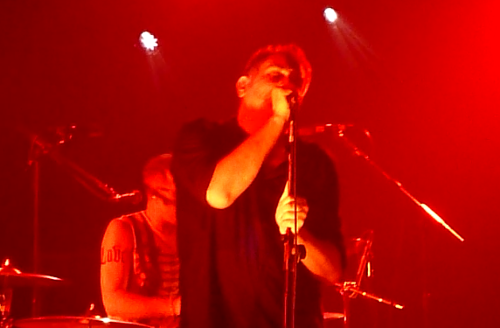 It was the Saturday night which provided the real focus, at least for a certain set of the audience. The revitalised Pop Group were another revelation which several decades of waiting to see them play live didn’t in any way diminish, and maybe enhanced. As a frontman, Mark Stewart was a righteous pillar of vehement indignation, railing against the state and power’s corruptions with the familiar charismatically bitter demeanour of his solo career. Needless to say, The Pop Group’s activist stance has come full circle in its relevance to twenty-first century Britain, globalised style. Here, with the tightly-coiled band to back it up, the whole was an invigorating blast from the Eighties which was still as scathing in lambasting oppression and strife, powerful in its struggle in the face of the latest Tory-led assault on the notion of any social role for the state.
It was the Saturday night which provided the real focus, at least for a certain set of the audience. The revitalised Pop Group were another revelation which several decades of waiting to see them play live didn’t in any way diminish, and maybe enhanced. As a frontman, Mark Stewart was a righteous pillar of vehement indignation, railing against the state and power’s corruptions with the familiar charismatically bitter demeanour of his solo career. Needless to say, The Pop Group’s activist stance has come full circle in its relevance to twenty-first century Britain, globalised style. Here, with the tightly-coiled band to back it up, the whole was an invigorating blast from the Eighties which was still as scathing in lambasting oppression and strife, powerful in its struggle in the face of the latest Tory-led assault on the notion of any social role for the state.
Then came the pinnacle, the very point of going to this ATP, last or not: Loop. With a couple of decades of absence to make up, expectations of their resurgence were high, helped by positive reports from their warm-up gig as Soundheads in London the previous week. At the front, the mood of eager anticipation was palpable as the lights started to glow and the smoke machines filled up the air to twinkling point. When the band strode out onstage, it was of course no longer with the fearsomely hirsute demeanour of old report – instead, a more human appearance greeted the audience, of four musicians who had been away on various projects in various places, and who were back at last.
So when the first guitar notes kicked in from Robert Hampson and Scott Dowson, as John Wills‘ drums pounded and Neil Mackay‘s bass shook the pillars of the stage downstairs, the fun really began. What had been a throng ready for action became one in slamming Brownian motion. There’s nothing quite like a moshpit for gauging the effect a band can have on a mass of people, especially one built up into such a state of expectation as this. Crowd surfers blossomed like the Nineties had never gone away, arms, legs and bodies flailing under the strobes and in spasmodic waves to the scrawls of the guitars and the battering which Loop brought down upon their collective heads. While the shoving and flailing was energetic, it was also never vicious or brutal, with hands eager to help those who stumbled or fell in a gratifying display of communal care for one’s fellow revellers which would chill the hardest heart of the most libertarian of Neocons.Meanwhile, provoking all this joyful anarchy, Loop surged on through storming versions of “Arc Lite,” “Collision Time” and a host more of songs so familiar in their impact on record that the thrill of hearing them live from the eye of a hurricane of humanity intent on letting out all the energy, sweat and passion usually absent from an English winter was one of those peak experiences which the average concert simply cannot provide. “Fever Knife” was a special case where the headbanging took over, providing something of a respite from the whirl of bodies, and a real surprise was the addition of a new Can cover to their repertoire, “Deadly Doris” (revealed on The Lost Tapes) segueing into the klangstorm of “Mother Sky,” which relentlessly delivered the fittingly immense conclusion to a gig whose bravura performance was more than worth the wait.
*
So how did the ATP-on-sea story end, with a bang or a whimper? Perhaps a bit of both, as Mogwai filled the heaving, perspiring upstairs to almost capacity while the DJs and the dregs of karaoke held the remaining floor below. Decked out in party clothes (even the Grim Reaper was there), in tuxedos of all shades and sorts and posh frocks of every variety, cross-dressed or otherwise, the crowd were a fine sight in their determination to give the old place one more go, a last decent send-off (until any possible Return to ATP should such a thing materialise after a suitable interval).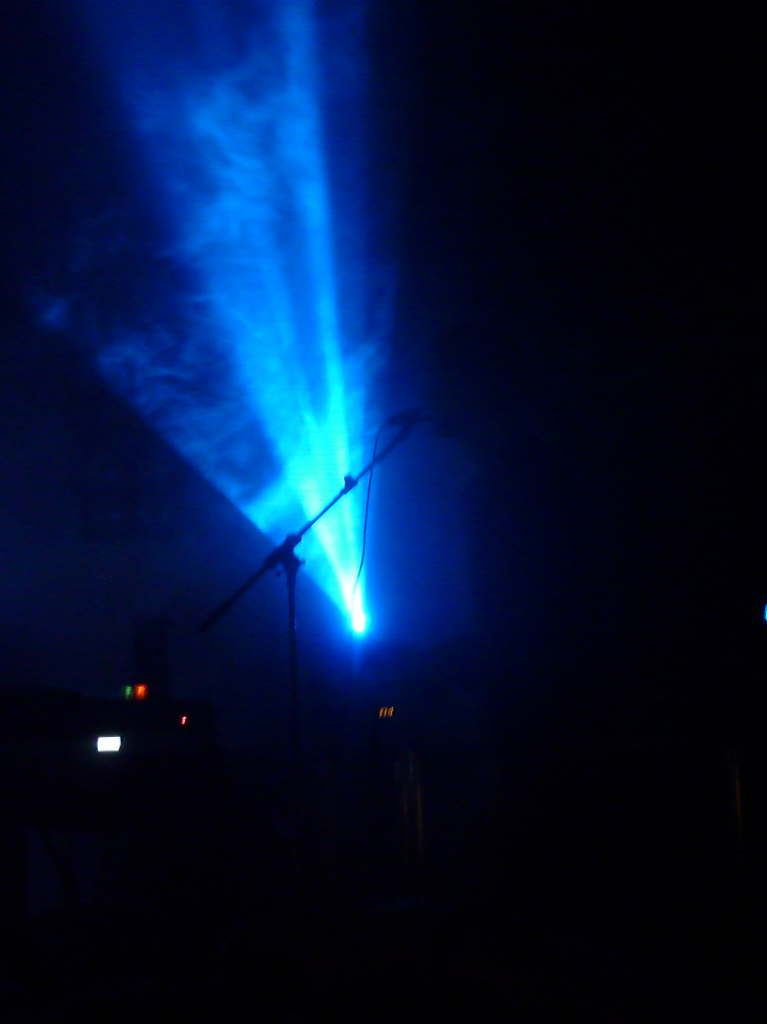 Mogwai are one of those bands who make an immense sound, and who have built a solid reputation for delivering a show, a performance, for making a loud noise on their guitars which is complemented by a drifting, melodic side as well as occasional flourishes of metronomic rhythm and groove. In other words, a lot like a combination of Loop, Slint and NEU!, which maybe helps explain the selection of artists for this summation of the ATP experience.
Mogwai are one of those bands who make an immense sound, and who have built a solid reputation for delivering a show, a performance, for making a loud noise on their guitars which is complemented by a drifting, melodic side as well as occasional flourishes of metronomic rhythm and groove. In other words, a lot like a combination of Loop, Slint and NEU!, which maybe helps explain the selection of artists for this summation of the ATP experience.
So many of the bands who played at the End of an Era were almost fixtures at the festival over the years (Shellac, Fuck Buttons, Om, The Magic Band), but no-one else really sums up the nature of the place like Mogwai do. Unfortunately, this comes too often in the songs which are so obviously in the mould of their heroes – and perhaps s a result of just having witnessed those same templates in action, the results frequently nearly sounded right. The volume, the interplay of instruments did work their noisy, rhythmic, all-encompassing wormholes into the fabric of the building, but all the while never really capturing the feel which the originals provide. Mogwai played for hours, giving the faithful just what they wanted even as some others were left colder; so it goes. But they did provide a suitable conclusion to proceedings, and their final farewell speech from the stage was heartfelt and well-said.
Then it was over, the lights were brought up and the bars – already reduced to serving beers in cardboard fizzy drink containers – gradually pulled in the shutters. The aftershow music over the PA, meant to accompany the drift of the crowd outside and into the future, instead kept them dancing, the floor held by a throng which energetically partied to the righteously fierce strains of Sonic Youth’s “Teenage Riot.” But even that came to an end, and there was no more music but the sound of the crunch of thousands of plastic glasses being trampled underfoot as the celebrants made their way down into the tender mercies of the remaining DJs and The Queen Vic.-Richard Fontenoy-
